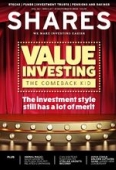Archived article
Please note that tax, investment, pension and ISA rules can change and the information and any views contained in this article may now be inaccurate.
Not furloughing staff could be a badge of quality for a business

The UK Government’s wage subsidy scheme is due to end in October, a deadline that could spark a fresh wave of corporate redundancies and financial stress.
For investors, this means taking action to ensure their stock portfolios are culled of potential financial basket cases and focused on quality companies that are stable, robust, and most likely to sustain shareholder returns through future turmoil.
PROPPING UP EMPLOYMENT
An estimated 9.6 million jobs, spread over 1.2 million different employers, were furloughed in the UK as part of the Government’s job retention scheme, according to figures from Statista. The scheme, introduced in response to the economic damage caused by the Covid-19 pandemic, covers 80% of an employees’ usual monthly wage, up to £2,500, tapering to 70% in September, and 60% from 1 to 31 October, when the scheme closes down.
Analysts at investment bank Liberum estimate that the workforce furlough scheme and corporate financing facilities put in place have injected close to £50 billion into the economy since March, with that figure expected to rise to around £80 billion by the time the furlogh scheme stops next month, based on Statista calculations.
To pay for this scheme, among others, it is likely the Government will have to resort to levels of borrowing not seen since the Second World War.
In May 2020, UK unemployment was running at 3.9%, one of the lowest recorded unemployment rates since 2010.
Since then, companies including International Consolidated Airlines (IAG), Royal Mail (RMG), Lloyds (LLOY), Rolls-Royce (RR.) plus an abundance of retailers including Marks & Spencer (MKS) have announced plans to slash thousands from their workforces.
The Office of Budget Responsibility predicts nearly 12% unemployment in the last quarter of 2020, albeit as a worst case scenario.
DEFENSIVE QUALITY
This has led Liberum’s analysts to the conclusion that companies who have not had to rely on Government support through the pandemic may offer defensive characteristics.
‘Companies that did not furlough any employees despite operating in cyclical industries have demonstrated the ability to weather a major pandemic,’ it says, and they represent ‘defensive choices for investors concerned about future lockdowns or second waves’.
Alternatively, stocks which have chosen to self-fund or repay furlough support even though they are under no obligation to do so provide a strong indication of both corporate governance and future shareholder returns adds Liberum.
With limited formal information available Liberum compiled its own database by scanning FTSE 350 company announcements that mentioned certain key words and phrases to gauge the level of use of the Government’s job retention scheme since inception.
The broker’s findings indicated that within two months of launch, over 60 companies had started claiming subsidies for furloughed employees, rising gradually since May to 83 of the UK’s 350 largest companies. But more interestingly, they also tracked companies that had pledged not to furlough any employees. That number now tops 75 since April.
We have added our own layer of analysis to Liberum’s sample list of 30-odd companies, which includes names like chemicals firm Croda (CRDA), defence equipment supplier Avon Rubber (AVON), Games Workshop (GAW) and Bodycote (BOY).
Some of the world’s top investors, including Warren Buffett, Terry Smith, and Nick Train put a lot of store in return on capital employed (ROCE) and return on equity (ROE) figures as a way to gauge the quality of a company.
In simple terms, high ROCE and ROE means that companies are very effective at generating profits. Often, this profitability is the result of a competitive advantage, such as a strong brand, unique products or best in class technology.
To be a truly high-quality company, a stock needs to demonstrate that high levels of ROCE and ROE can be consistently repeatable.
Companies that can generate profits throughout the economic cycle could offer protection during market downturns as well as above-average returns over the long-run.
Important information:
These articles are provided by Shares magazine which is published by AJ Bell Media, a part of AJ Bell. Shares is not written by AJ Bell.
Shares is provided for your general information and use and is not a personal recommendation to invest. It is not intended to be relied upon by you in making or not making any investment decisions. The investments referred to in these articles will not be suitable for all investors. If in doubt please seek appropriate independent financial advice.
Investors acting on the information in these articles do so at their own risk and AJ Bell Media and its staff do not accept liability for losses suffered by investors as a result of their investment decisions.

 magazine
magazine










